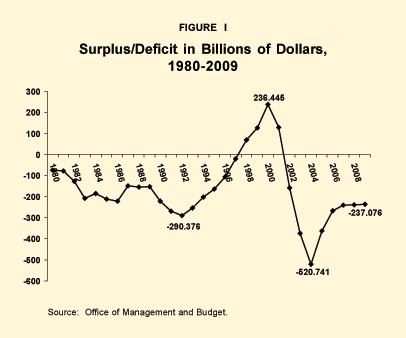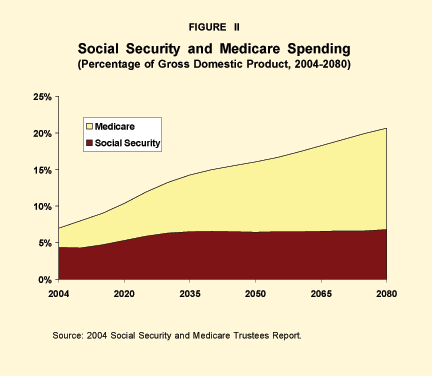The president's budget for fiscal year 2005, which starts October 1, 2004, projects that the deficit will be cut in half as a percentage of gross domestic product (GDP) by 2010. After record deficits of $375 billion in 2002 and $520 billion in 2003, the deficit is projected to slowly decline. In 2009, however, the shortfall will still be $237 billion. [See Figure I.] And a number of factors will make even that modest goal difficult to meet.

The White House's Office of Management and Budget (OMB) prepares the president's budget. The Congressional Budget Office (CBO) also makes long-term budget forecasts, which, by law, Congress must use in passing its annual budget resolution. A January 2004 CBO report projects that the deficit will disappear completely by 2014 – but that claim is based on completely unrealistic assumptions, examined in detail below. In truth, the long-term budget outlook is much worse than projected by either the OMB or CBO.
Discretionary Spending. The president's budget assumes that the growth of domestic discretionary spending – which must be appropriated by Congress – will be held to 4 percent a year. Domestic discretionary spending (for functions not related to homeland security) would rise by only one-half percent per year under the president's budget proposal.
Without strong White House pressure to hold down spending, congressional appropriators are likely to lard the budget with pork barrel spending. Thus, by the end of the legislative process in September, the federal government's fiscal situation will probably be worse than it is now.
Expiring Tax Cuts. All of the tax cuts enacted since 2001 will expire some time before 2010. Because the cuts were made temporary by decades old Senate rules, the CBO estimates must assume that all tax cuts enacted in the last three years will expire on schedule and that no new tax changes are enacted. The CBO further projects that extending all of these provisions would reduce federal revenues by $2.3 trillion between 2005 and 2014.
The Alternative Minimum Tax. Even if a new president were to veto all efforts to extend the tax cuts, a looming tax problem must still be addressed. Unless action is taken soon, the Alternative Minimum Tax (AMT) will begin affecting vast numbers of Americans next year. The CBO estimates that the number of individuals paying this tax – originally enacted to target high-income individuals – will rise from 2 million to 23 million over the next 10 years. This will happen automatically because the AMT's income thresholds are not indexed to inflation or real income growth. Thus, as incomes rise with inflation, more and more people are pushed into the AMT.
No president is going to let this happen. As more and more Americans are forced to pay this onerous tax, public outcry will become immense. But just indexing the AMT to inflation will reduce projected revenues by almost $500 billion between 2005 and 2014.
Entitlement Programs. Even if Congress miraculously holds the line on domestic discretionary spending, entitlements are still a problem. These are programs that do not require annual Congressional approval – spending is automatic.
Although President Bush has pledged to reform Social Security, that is not where the biggest problem lies. Medicare is in much more serious shape – and worsened recently when Congress added a huge new drug benefit to the system. Demographics drive cost projections for Social Security, so the numbers tend to be fairly accurate. But Medicare spending is much harder to predict because the cost of medical services has risen sharply over time. As Figure II shows:

Spending for Social Security is only projected to rise from 4 percent of GDP to 6.8 percent in 2080.
But Medicare is projected to rise from 2 percent to more than 12 percent of GDP over the same period – more than $1 trillion per year in today's economy, and the absolute minimum increase we can expect.
The recent addition of an expensive and underfunded benefit to Medicare for prescription drugs means that future spending will be much greater than projected by the Social Security and Medical Trustees, especially since drug prices are also likely to rise as demand outstrips supply.
Congress's budget resolution provided only $400 billion over 10 years to pay for the drug benefit; any figure much larger would have killed it. However, on Jan. 30, 2004, the New York Times reported that the Bush Administration's internal estimate was that the drug bill passed by Congress would actually cost $534 billion over 10 years. Had Congress known this figure, the bill would likely have been defeated.
Of course, Congress played its own games with the drug bill. It delayed the actual start of benefits for two years, meaning that $400 billion will really be spent in eight years rather than 10. Moreover, the program is phased-in so that spending in the early years is low. As the years progress, however, spending shoots up rapidly. CBO Director Douglas Holtz-Eakin predicts that spending for seniors' drugs will rise to $2 trillion in the second 10 years.
Stewardship. A chilling picture of long-term budgetary trends is buried in an appendix volume under the unlikely title "Stewardship" in the president's budget.
- It shows federal spending rising from about 20 percent of the gross domestic product this year to 53 percent in 2080.
- Much of the increased spending is due to interest payments on the debt, which will rise by 20 percent of GDP.
The increased spending on debt is included because the budget assumes that taxes will not rise to finance increasing entitlement spending. But in all likelihood, taxes will rise sharply at some point. It is completely unrealistic to think that federal taxes will remain close to 20 percent of GDP for the next 75 years
Conclusion. Without entitlement reform, taxes will probably rise by an amount at least equal to the projected rise in entitlement spending. President Bush has talked about the need to reform Social Security, but the budget makes clear that Medicare is an even greater problem – and in need of immediate reform.
The budget itself admits that these trends are "unsustainable." If Congress is unwilling to reduce its future obligations to retirees, the only way to make these trends sustainable is by raising taxes significantly, a move unlikely to be welcomed by American taxpayers.
Bruce Bartlett is a senior fellow with the National Center for Policy Analysis.